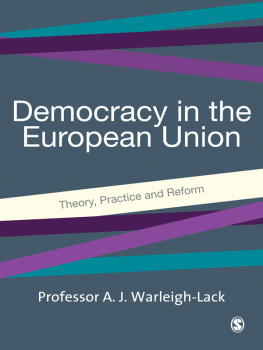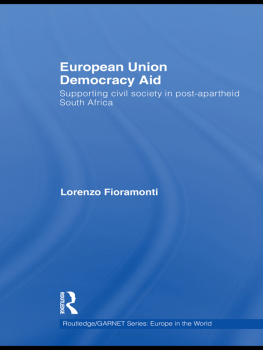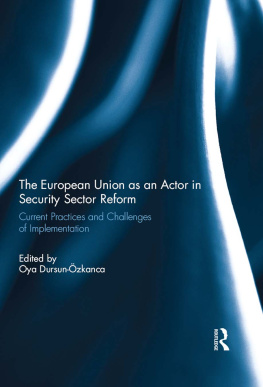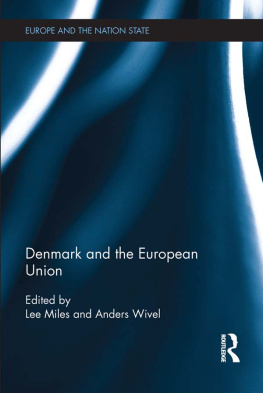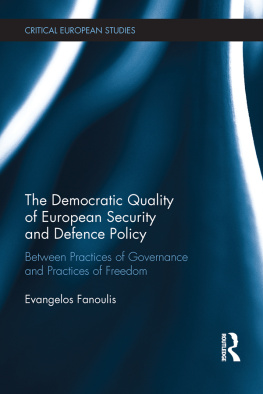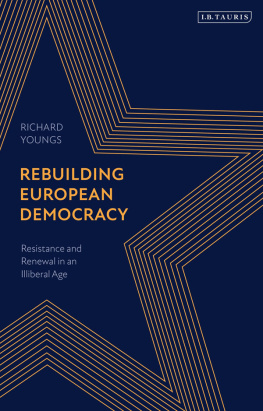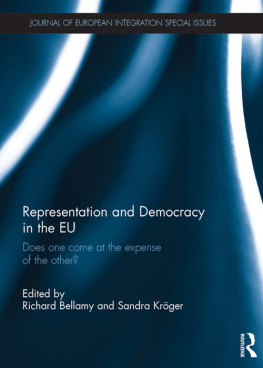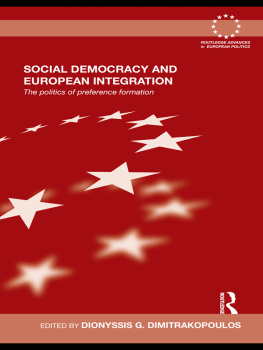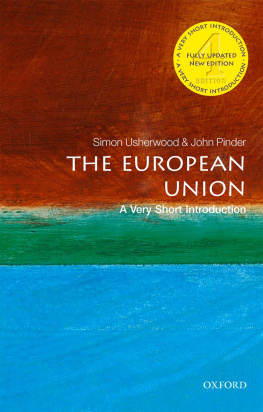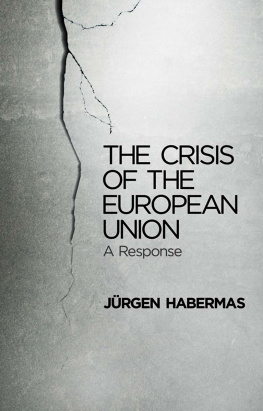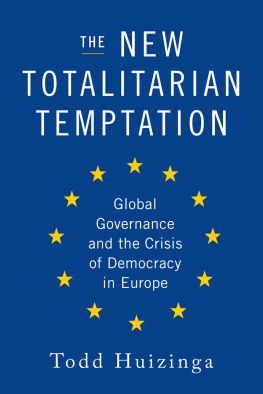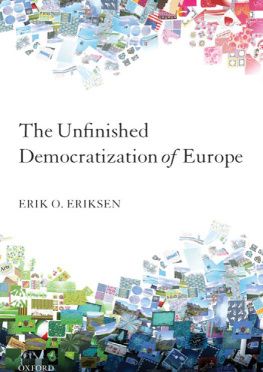Democracy in the European Union
Democracy and the
European Union
Theory, Practice and Reform
Alex Warleigh
Alex Warleigh 2003
First published 2003
Reprinted 2006
Apart from any fair dealing for the purposes of research or private study, or criticism or review, as permitted under the Copyright, Designs and Patents Act, 1988, this publication may be reproduced, stored or transmitted in any form, or by any means, only with the prior permission in writing of the publishers, or in the case of reprographic reproduction, in accordance with the terms of licences issued by the Copyright Licensing Agency. Inquiries concerning reproduction outside those terms should be sent to the publishers.
| SAGE Publications Ltd
1 Olivers Yard, 55 City Road
London EC1Y ISP |
SAGE Publications Inc.
2455 Teller Road
Thousand Oaks, California 91320 |
SAGE Publications India Pvt Ltd
B-42, Panchsheel Enclave
Post Box 4109
New Delhi 110 017 |
British Library Cataloguing in Publication data
A catalogue record for this book is available
from the British Library
ISBN 0 7619 7280 3 | ISBN-13: 978-0-7619-7280-8 |
ISBN 0 7619 7281 1 (pbk) | ISBN-13:978-0-7619-7281-5 (pbk) |
Library of Congress Control Number 2002112352
Typeset by C&M Digitals (P) Ltd., Chennai, India
Printed in Great Britain by Athenaeum Press, Gateshead
For Christopher, who believes the book will be dedicated to him, and so it is.
This is also for Mrs P. and She, with thanks for their fabulous performances in a Supporting Role. No tears now, ladies, just take the trophy and get off the dais.
Acknowledgements
Writing a book such as this the author inevitably incurs debts to many people, particularly if, as in the present case, it draws on a decade or so of research into, thinking about, and even doing European integration.
I would like to thank Lucy Robinson at Sage for her kind extension to my deadline and being so positive about the project in general. The Leverhulme Trust (Grant F/239/AA), the European Commission (TSER Contract SOE2-CT97-3056) and the ESRC (Grant L213 25 2022) provided generous funding for different aspects of the research undertaken for this book. My partners in the EURCIT network made many helpful contributions to the evolution of my thinking over several years, and my thanks go to all of them, but to Richard Bellamy, Dimitris Chryssochoou, Dario Castiglione, Andreas Follesdal, and Jo Shaw a special debt is due. Students at Reading and Belfast also made me probe and question some of my thinking, even if they werent always aware of this! My thanks go in particular to the students who took my MA course at Reading in Democracy and Reform in the EU.
Richard Bellamy, Ciarn OKelly and Elizabeth Meehan provided very helpful feedback on drafts of some of the chapters in this book. As usual, I am indebted to them for their insights and remain responsible for any remaining shortcomings in the text.
Finally, I owe thanks to all those friends and family who bore with me as I completed this book not in the hoped-for sabbatical term but as an accompaniment to taking up a new post in Belfast. I look forward to rediscovering what weekends and evenings are for.
Preface: Thoughts of a Critical European
This is not a Eurosceptic book. It does not seek to challenge the legitimacy of the European integration project itself, but rather to uncover why some of the various strategies that the EU institutions and member states have used to improve the EUs democratic credentials have not worked successfully. I do not think that these failures were inevitable because the EU itself is in some way irretrievably flawed or powerless. Neither do I think these failures are impossible to rectify. Indeed, the last chapter of this book draws conclusions about how the process of democratisation in the EU could be advanced. To that end, I have tried to be historically literate and to draw on political history, political theory, legal science, international relations, and EU studies literatures, as well as empirical evidence gained through original primary research.
However, this book does challenge some of the conventional wisdom about how the EU might be made more democratic from both pro-and anti-integration perspectives. I ask the reader to lay aside, or at least question, some of the easy assumptions made by both groups about the European integration process, that I think are in danger of becoming rival, unquestionable catechisms. The mere fact that this book does not argue in favour of a European Federation does not make it an intergovernmentalist tome. In fact, as I make clear throughout the book, I lay no great normative significance on the concept of national sovereignty. In other publications, I have demonstrated both theoretically and empirically that the national governments of the EU which might be considered its principal contracting parties do not, and should not, control every meaningful aspect of the integration process or the EU political system. I do, however, attach great importance to the idea of popular sovereignty, and it is for that reason that my concern with improving the democratic credentials of the EU has been so enduring.
I am conscious that as someone whose political identity is perceived as British (and, moreover, English), it may seem to those in other member states that my approach to the European integration project is predictably cautious. At least, so it appears to have seemed to many colleagues from other member states, who conveniently forget that for every Margaret Thatcher there is a Charles de Gaulle, Umberto Bossi or Edmund Stoiber, not to mention restless natives in Denmark and the Irish Republic. This oubli is even more ironic given that unlike many academics, I actually devoted a year of my life to working in the European Parliament, in order to help, in a small way, improve the content of EU legislation and reinforce the Parliament in its day-to-day encounters with the national governments and other EU institutions.
As an academic, I consider it my duty to be critical in my thinking: evaluative, reflective, and, as far as possible, objective. I do not subscribe to any theoretical or strategic view of European integration without questioning it. As a long-standing member of the European Movement, I believe profoundly that the European Union has much to offer as a model and instrument of political, economic and social organisation which transcends (yes, that word!) the nation state. As a lifelong holder of political principles towards the Left/Ecological end of the traditional spectrum, however, I also cannot help but be aware of ways in which the current EU might be improved. My aim, and hope, for this book is that it will make a positive contribution to the ongoing debate about EU democratic reform, and thereby help ensure that the EU is as central to the European continents good governance in the 21st century as it was to the post-World War II recovery of its Western half.
Alex Warleigh
Belfast
1
Introductory Overview: The Democratic Deficit and the Normative Turn in European Union Studies

